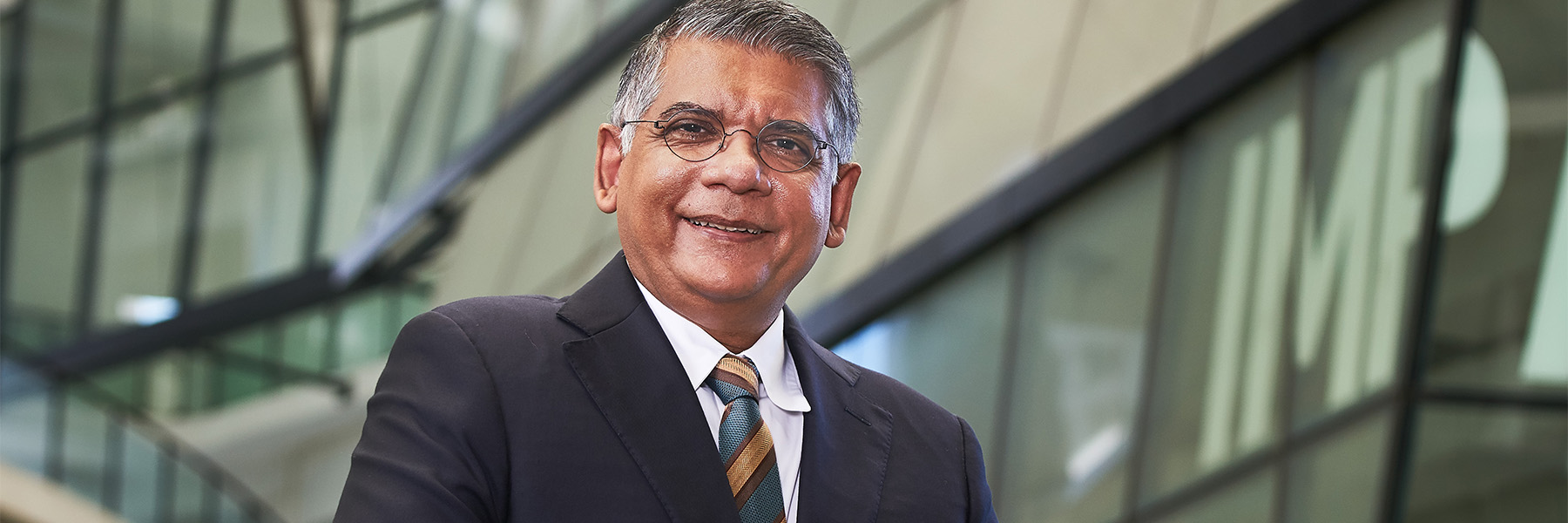Venka Purushothaman, deputy president and provost for LaSalle College of the Arts in Singapore, credits York University with opening his eyes to the potential of the arts, the field in which he has made his career.
By Elaine Smith
From the beginning of his post-secondary journey, it seemed quite likely that Venka Purushothaman, who earned an honours bachelor of arts degree in English literature and mass communication and a master’s degree in English literature from York University, would pursue an academic career, and he has – but not as a professor of English. Instead, Purushothaman’s path led him to arts criticism and administration before he earned a PhD in Singaporean cultural policy and festival culture at the University of Melbourne in Australia. He has since spent 20 years at LaSalle College as a professor and administrator and will be part of the college committee that works with the government to form a national university of the arts in Singapore.
As a secondary school student, Purushothaman was eager to pursue a university degree somewhere different from Singapore, because he needed to see the world. “I spun a globe and put my finger on it and the closest spot to where it landed was Newfoundland, so I decided to come to Canada to study,” he said.
Always curious, Purushothaman began reading extensively about Canada and was inspired. When he arrived, he decided to see the country before applying to university as a way of becoming comfortable with colloquial English and building his confidence; he put on his backpack and travelled.
Purushothaman decided to pursue a liberal arts education focusing on literature because he loved to read. Toronto appealed to him because, like Singapore, it was multicultural, although “Toronto was taking multiculturalism to another level,” he said, noting that York’s curriculum and approach to learning seemed like a good fit, mixing the traditional literary canon with postcolonial works. “The first-year offerings were diverse and wide and opened up new ways of thinking,” he said.
As he absorbed these new ideas, Purushothaman also worked on campus. One of the jobs he had later in his undergraduate career was as senior don for Winters College. At the time, Winters was becoming the fine arts residence, and Purushothaman soon got to know many budding artists.
“It was a bridge to understanding the arts in its many manifestations,” he said. “I went to all kinds of performances and exhibitions to support my friends and I became more in tune with contemporary arts. It was a transformative environment.”
After earning his master’s degree, Purushothaman visited his family in Singapore, intending to return to Canada and find a position in copywriting or editing. However, fate decreed otherwise. The arts were taking root in Singapore, and he was recruited to work as an arts administrator for the Singapore Arts Centre Co. Ltd. to help establish a national arts centre, the first in the country. Purushothaman travelled the world to visit arts facilities, including Harbourfront and Roy Thomson Hall in Toronto. All the while, he continued writing, reviewing the visual arts and theatre work, he says, “that fed my soul.”
This job led him to other arts administration positions and, eventually, back to academia: first to his PhD studies and then to LaSalle College, where “I blended my interest in academia and the multi-faceted arts and creative industries.”
“I have been philosophically committed to transformative arts education,” Purushothaman said. “I do not want us to be siloed by history and tradition. Arts education should always be pioneering in that regard. Artists are resourceful and inventive, always looking for creative ways of learning. These modalities are now also valued by the non-arts sector and the place of creativity in many organizations is highly valued.”
Purushothaman believes in learning from the best and has used collaboration to tap into new ways of thinking and educating. In addition to creating the Asia-Pacific Network for Cultural Education (ANCER), he is a founder of a Global Design Initiative that pairs LaSalle with five other universities worldwide who are exploring new approaches to design education. The college is also a member of the Shared Campus Project, a consortium of universities who have a co-operation platform for international education formats and research networks. Purushothaman is also looking forward to making connections with the School of the Arts, Media, Performance and Design at York University.
“I want to see how we can find a common space to collaborate, because I truly believe in that global exchange,” he said.
Meanwhile, his latest endeavour is assisting in forming an alliance of Singapore’s two arts colleges to create a national university of the arts.
“It’s an exciting time,” he said. “It fits with the world class universities that Singapore already has. While we are seeing cuts to the arts in many countries, our government has a vision for multiple peaks of excellence. It is giving its stamp of approval to the arts, which is only fitting, because the arts are pervasive in society and help people realize their own potential.”
The arts and his early pursuit of an international education have led Purushothaman to discover and build upon his own potential and generations of artists and students have benefited.


